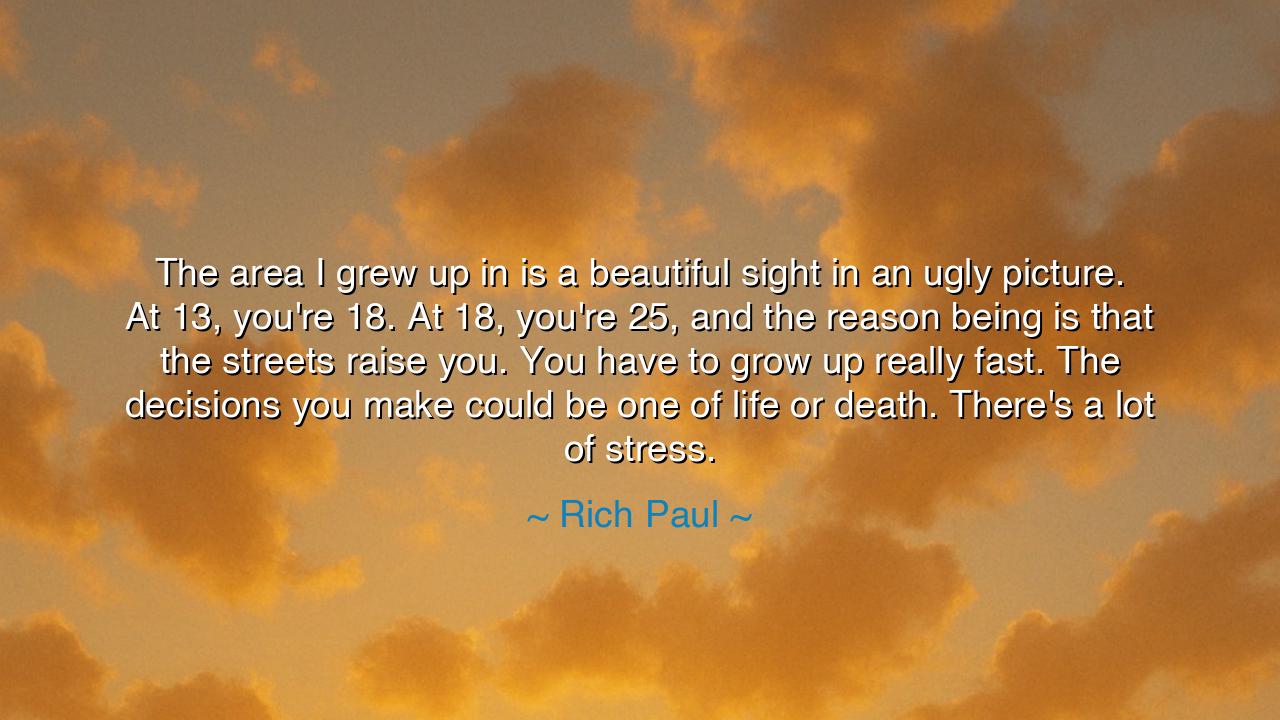
The area I grew up in is a beautiful sight in an ugly picture. At
The area I grew up in is a beautiful sight in an ugly picture. At 13, you're 18. At 18, you're 25, and the reason being is that the streets raise you. You have to grow up really fast. The decisions you make could be one of life or death. There's a lot of stress.






In the words of Rich Paul, “The area I grew up in is a beautiful sight in an ugly picture. At 13, you're 18. At 18, you're 25, and the reason being is that the streets raise you. You have to grow up really fast. The decisions you make could be one of life or death. There's a lot of stress,” we hear the voice of a man who has lived through the hard schooling of survival. These words speak of the paradox of life in struggle—of beauty amidst hardship, of youth aged too soon, and of the resilience born in adversity. They remind us that even in the roughest soil, the seed of greatness can take root, but that growth under such conditions demands both strength and sorrow. It is a truth as ancient as humanity itself: that suffering, when endured with courage, forges wisdom and purpose.
The meaning of this quote lies in the contrast between innocence and experience, between the beauty of potential and the ugliness of environment. When Rich Paul speaks of “a beautiful sight in an ugly picture,” he describes not only a place, but a spirit—the radiance of human possibility trapped within a harsh world. His words recall the wisdom of the old philosophers who taught that virtue shines brightest in darkness. To grow up in a place where the streets raise you is to learn early the cost of every choice, to carry the weight of survival while others still dream in safety. Childhood, in such a place, is a luxury few can afford. The heart hardens not from cruelty, but from necessity.
This transformation of youth into premature adulthood is not new to history. Consider the story of Frederick Douglass, who was born into slavery and knew, even as a child, that the wrong word or glance could cost him his life. By the age of thirteen, he had the mind of a man, sharpened by injustice and illuminated by the fire of hope. The same is true of those raised in the unforgiving streets of modern cities—where every day teaches lessons of loyalty, danger, and endurance. To live there is to understand the ancient truth that life and death are separated by a breath, and that every decision, however small, carries the weight of destiny.
When Rich Paul says, “At 13, you’re 18. At 18, you’re 25,” he describes not the passage of years, but the acceleration of experience. In the streets, time does not flow gently—it strikes like lightning. The need to protect oneself, to provide, to survive, compresses the soul’s journey. Yet from such crucibles, greatness can emerge. Paul himself rose from these beginnings to become one of the most influential sports agents of his generation, proving that pain can be alchemy—that hardship, when met with vision and resilience, can turn despair into mastery. But this victory does not erase the truth of his words: the cost of growing up too fast is the loss of innocence, the burden of wisdom earned too soon.
The stress he speaks of is not mere anxiety; it is the constant awareness that life hangs by a thread. Such pressure can crush, but it can also crystallize the soul. The ancients compared this to the forging of steel—the harder the fire, the stronger the blade. Yet even steel, no matter how sharp, carries the memory of heat. The lesson here is not to glorify hardship, but to understand it—to see in it the shaping force that both wounds and empowers. Those who survive such beginnings carry with them a fierce empathy, for they have seen how fragile life can be.
There is also profound beauty in this struggle. For though the picture may be “ugly,” those who rise from it are proof of the human spirit’s defiance. They are the flowers growing through cracks in stone, the light that refuses to dim. This duality—the coexistence of pain and beauty—is what gives Rich Paul’s words their timeless weight. He reminds us that greatness is not always born in comfort, but often in chaos, where the soul learns to fight not only for life, but for dignity and purpose.
And so, O listener, the lesson is clear: do not judge a person by the picture they were born into, but by the beauty they have drawn from it. Understand that every soul raised by hardship carries stories of silent battles and unspoken strength. If you come from such a place, let not bitterness consume you—let your trials become your teachers. If you do not, then walk with compassion for those who have borne the fire. For as Rich Paul teaches us, life tests us not where we are comfortable, but where we are cornered—and the measure of a person lies in how they rise from the streets that sought to hold them down.
So honor your beginnings, however rough they may be. Carry their lessons, not their limits. And when the world seems an ugly picture, look for the beauty within it—for that beauty, fragile yet fierce, is the mark of your humanity and the proof of your endurance.






AAdministratorAdministrator
Welcome, honored guests. Please leave a comment, we will respond soon